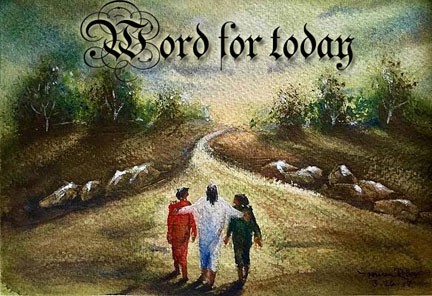Watch
Events
Articles
Market
More
The first war to end all wars ended on the eleventh hour of the eleventh day of the eleventh month in 1918. Armistice Day or Remembrance Day around the world and later Veterans’ Day in the United States, is a time to pause and remember every service member who has served. We should also remember the sacrifice the families of those who served as well. The people who knew them personally will mention their names and keep their memories alive. Exodus 3:15, “God also told Moses, “Say to the Israelites, ‘יהוה , the God of your fathers— the God of Abraham, the God of Isaac, and the God of Jacob— has sent me to you.’ This is My name forever, and this is how I am to be remembered in every generation.” Just as our Creator told Moses that His name is how we remember Him, we mention the names of those who served to remember them.



Thought for Today: Tuesday November 11
Yeshua Himself claimed to be divine. “I and the Father are One” {John 10:30}. His miracles backed up His claim, as did His assertion that He could forgive sins – Something only YHVH can do. {Luke 5:20-25}. In addition, repeatedly the Gospel writers pointed out the way He fulfilled the Old Testament’s prophesies concerning the Moshiach, Who was to be called “Emmanuel” [which means] “YHVH with us” {Matthew 1:23}. But Yeshua’s divinity was demonstrated most of all by His resurrection from the dead and His ascension into heaven – events that were witnessed by hundreds.



Then I asked her, ‘Whose daughter are you?’ She said, ‘The daughter of Bethuel, Nahor's son, whom Milcah bore to him.’ So I put the ring on her nose and the bracelets on her arms.
Genesis 24:47 ESV
Eliezer relates these events in reverse order. He actually gave her the rings and then asked her whose daughter she was. He led with the fact that would have carried less weight with his audience (blood relations), but perhaps he wanted them to put more weight on, knowing that they would be more interested in the gold.



Go therefore and make disciples of all nations, baptizing them in the name of the Father and of the Son and of the Holy Spirit, teaching them to observe all that I have commanded you. And behold, I am with you always, to the end of the age.
Matthew 28:19-20 ESV
This soundly disproves the hyper-dispensationalist and metanomian doctrine that all of Yeshua’s teachings prior to the cross were only for the Jews. It also disproves the idea that the Law is only for the Jews.



And Jesus came and said to them, All authority in heaven and on earth has been given to me.
Matthew 28:18 ESV
Satan has power over those who have submitted to him, but Yeshua has all authority in heaven and earth, even over Satan.
This parallels Genesis 45:9 where Joseph sends word to Jacob that he has been given all authority in Egypt.



Just a thought:
If You get fat, people think you eat too much.
If you lose weight. People think you're sick.
If you dress well, you're showing off.
If you dress simple, you're poor.
If you speak your mind, you're rude and if you don't, you're a coward.
If your successful , you are arrogant and if you're struggling your lazy.
If you're honest you are naive.
If you are a believer in Yeshua, the whole world will turn against you, even some loved ones.
If you publicly testify your faith, governments will silence you.
No matter what you do in life. people will always criticize you without fail. So, do not take to heart what people think or say. Live for YHVH Elohiym -- make it a eternal life's mission.



111025 / 18th day of the 8th month 5768
WORD FOR TODAY “a prayer that we all should pray today”: Gen 24:12 He said, "O LORD, the God of my master Abraham, please grant me success today, and show lovingkindness to my master Abraham.
WISDOM FOR TODAY: Pro 20:19 He who goes about as a slanderer reveals secrets, Therefore do not associate with a gossip.
Ask the LORD how you can get more blessings
www.BGMCTV.org



